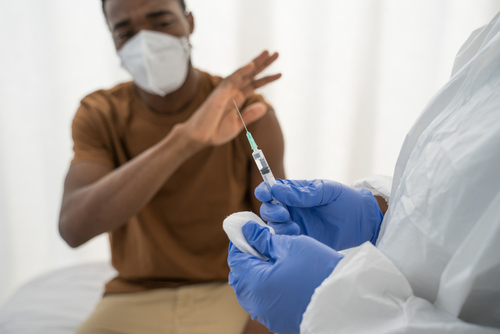PA and NJ nursing home employees refuse coronavirus vaccine:
42 percent of Philadelphia County nursing home staff have declined a coronavirus vaccine.
Nearly half of Pennsylvania and New Jersey nursing home employees have refused the coronavirus vaccine, presenting a serious COVID risk to vulnerable residents, according to articles in the Philadelphia Inquirer and at app.com.
According both to a survey recently released by the PA Department of Health and to data reported by New Jersey nursing homes as of April 21, just 52% of PA nursing home staff and 55.7% of NJ staff have been vaccinated. Overcoming vaccine hesitancy and other barriers to vaccination remain a challenge in the objective of attaining the degree of immunity necessary to put an end to the pandemic’s spread. Current vaccination rates are too low at many facilities to prevent future outbreaks of the disease that has claimed the lives of over 8,000 NJ staff and residents and 13,000 of those in Pennsylvania to date.
PA and NJ nursing home employees refuse coronavirus vaccine more than residents of these nursing homes. About 80% of PA nursing home residents and around 85% of NJ residents are currently vaccinated.
While the data is clear that there has been a pronounced decline in cases and deaths since vaccination began last December—in Pennsylvania, for example, cases among residents fell 97%, while those among staff dropped almost 94%—vaccine reluctance among staff members persists.
The potential exists for unvaccinated nursing home employees to introduce the coronavirus into facilities and cause widespread illness or death—and not just among unvaccinated persons. Even the vaccinated elderly can develop a potentially deadly case of COVID-19. Across the country the hope is for staff vaccinations to increase so that visitation and social activities can continue to be increased for residents, a large majority of which were forced into isolation when the spread of COVID was at its height.
A sobering example of the dangers presented by unvaccinated staff recently occurred in a Kentucky nursing home. According to the Centers for Disease Control and Prevention, a single unvaccinated employee led to 46 infections, four hospitalizations, and three deaths. The Pfizer vaccine had been offered to residents and staff, leading to nearly 91% of residents and 53% of staff becoming vaccinated. The COVID outbreak that followed infected 20 staff members and 26 residents (respectively of these, four and 18 were vaccinated). Three of the residents (one of them vaccinated) died.
Overcoming low vaccination rates relies on getting to the bottom of why people are not getting vaccines and offering solutions. In some cases reluctance stems from fears that can be overcome by education and encouragement. In other cases, even though vaccine supply is no longer considered a barrier to getting vaccinated, access to a vaccine can be an issue for some (such as night shift workers), which might require different kinds of on-site vaccination visits. In still other cases, reluctance to get vaccinated relates to people’s unwillingness to subject themselves to side effects, which could be addressed by allowing paid sick time during which they can recover from their shots.
An Experienced Nursing Home Attorney You Can Trust
Ensuring the safety of the Philadelphia/PA or NJ nursing home where your loved one lives, or where he or she is considering moving, is a paramount consideration. Pennsylvania and New Jersey nursing homes are required to meet health and safety standards requirements and to ensure the physical, mental, and psycho/social well-being of their residents. If you need help choosing a nursing home, have concerns about the quality of care in a Pennsylvania or New Jersey nursing home, or suspect neglect, abuse, or fraud has occurred at the Pennsylvania, Philadelphia, or New Jersey nursing home where your loved one lives, please contact nursing home abuse attorney Brian P. Murphy to discover your legal rights and options.







